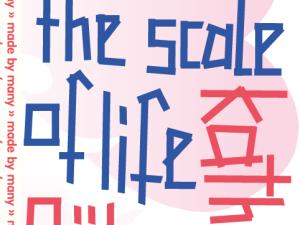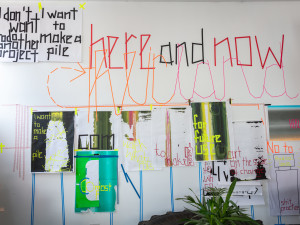Kathrin Böhm. COMPOST: For Future Use
–
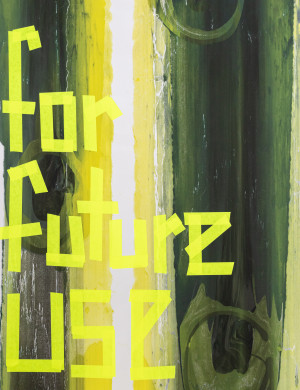
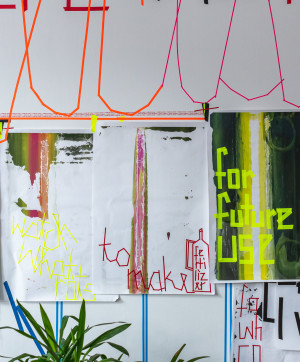
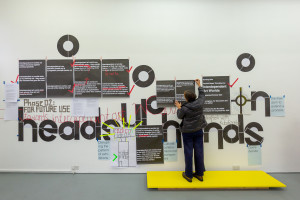
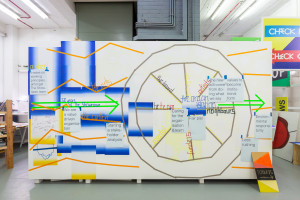
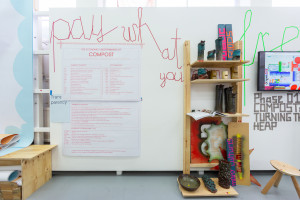
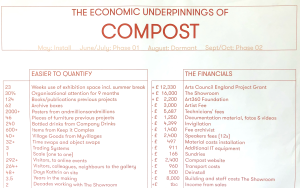
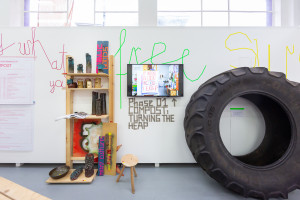
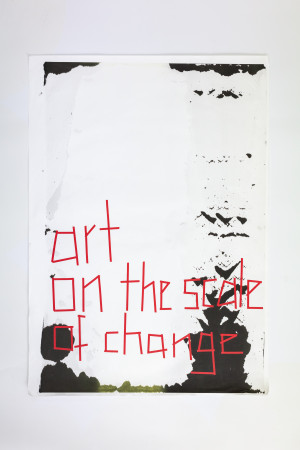
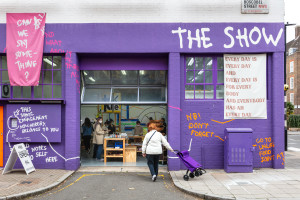
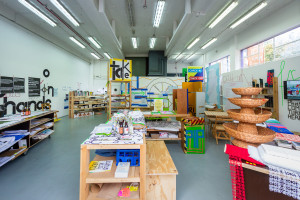
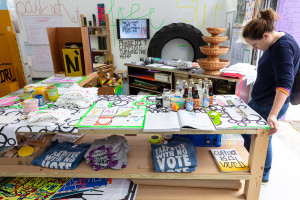
COMPOST was a unique collaborative exhibition that explored over twenty years of artist Kathrin Böhm’s practice. For six weeks throughout June and July 2021, a cumulation of objects and methodologies filled the gallery space at The Showroom, opening up an invitation to contribute to a process of fertiliser-making: to sieve through, to assess, to archive, and to reformulate Böhm’s practice by making use of her methods of production, working one-to-one, collaboratively and in public.
The cumulative and collaborative act of sieving through this material in the gallery space - a daily process of ‘turning the heap’ - generated multiple hybrid, serendipitous, invited and chance one-to-one encounters; opening up new interrogations with the materiality of the work and the ideas held within.
COMPOST then existed in a second phase, offering a space to start drawing out fertiliser for future use, whilst dissolving the work through swapping, buying, gifting and trading; enacting possibilities of queering economies within a wider political framework of interdependence, as discussed by Kathrin Böhm and Kuba Szreder (the Centre for Plausible Economies) in the Icebergian Economies of Contemporary Art.
Ideas that have surfaced throughout the collaborative process of composting accumulated around four intersecting themes. The exhibition space was therefore organised into four distinct yet interdependent parts:
Organisational use: following the motto of ‘talking the talk and walking the walk’, we ask how modes of organisation can align more closely with the radicality of the subject matter presented, and in relation to practicing a politics of care. This area was of direct practical use towards considering future structural, relational and economic underpinnings for The Showroom.
Kathrin Böhm’s personal use: this area held notes to self and reminders of what Kathrin might take for herself from the process of composting; including critical reflections on archival methodologies as they unfolded in practice, in public and with collaborators.
Diverse economies: this was a space for diagramming the wide realm of cultural work that is organised along lines of shared resources; highlighting the diverse and resilient economic underpinnings of solidarity economies; and exploring these in relation to COMPOST.
Takeaway: this largest area presented objects that were available to be taken away - either for free, to swap or for sale; where all cash sales were based on what the buyer could offer and if an item was swapped, the ideal would be to keep sharing and passing it on. In this way the materiality of COMPOST was dissolved through mutual transactions, until 16 October 2021.
Compost: Turning Points
In January 2021, Kathrin Böhm wrote the following statement:
*“For me this is the year to compost. To compost the many things I have made and been involved with, and to make fertiliser for the future. This plan has been in the making for a while, and to enter a new year, the one in which we get used to the end of things as we know them, makes the compost heap a timely rotting pile.
The publication of ‘The Social (Re)Production of Architecture: Politics, Values and Actions in Contemporary Practice’ by Doina Petrescu and Kim Trogal in 2017 was an important moment for me - when an idea becomes an embodied experience, and won’t leave. The simple but fundamental realisation that everything we do either supports or undermines a system. If we want systemic change, we need to care about the re-production of the values and systems we want, and not just their set up. In early 2020 I wrote in big letters that I would not do another project - instead I want to make a pile, and to see what rots and observe what survives. The compost heap and fertiliser making is in preparation.”*
As such, COMPOST in the form it has taken at The Showroom has been in-the-making for Kathrin Böhm for many years, stemming from a deep desire to not just produce, but to process and to carefully consider what to do next: what to continue, what to leave behind, and the need for fundamental shifts grounded by an acknowledgment of our entangled interdependence.
A guiding principle of transparency has been fundamental to the economic, social and material process of planning COMPOST and its realisation in public at The Showroom. The open format of an exhibition-in-use enables this collation of a body of work and its past contexts, to sieve through whilst actively reflecting, and in this way to produce fertiliser for the future: for Böhm, for the groups and colleagues she works with, for The Showroom as a team, and for everyone who becomes collaboratively involved. Reciprocally COMPOST constitutes a shared process of redefining institution-building for The Showroom; taking this approach to artistic production, exhibition-making and new models of sustainability as a method of enquiry. The decision to ‘make a pile’ is conceived in parallel to its dissolution. What does dissolution mean in this context, and under which circumstances will it now take place? Which new conditions will emerge from these processes?
Equipping for hybridity and future use
A constant for Kathrin Böhm is her 1:1 scale of operation, where the work is produced on the scale of the topic it addresses. COMPOST is therefore an exhibition that operates on the scale of the gallery and within the publicness of the institution.
To enable the process of composting at The Showroom, the space has been equipped with hybrid seating and shelving structures, which have been designed for use on-site through conversations between Kathrin, The Showroom curatorial team, artists Adam Shield and Elliott Denny; and subsequently built in-situ by Shield and Denny, followed by further preparations and finishing touches with Paulina Michnowska. Almost all of the materials used have been repurposed from those that were readily available at The Showroom in May 2021; the material residue of past installations being put to new use. A parallel digital space has been built in collaboration with designers An Endless Supply; and the digital life of COMPOST connecting activities at The Showroom to online publics has been enabled by Andy Jenkin.
Collaborators looking after the compost included Harry Blackett, Vanya Cantone, Oana Damir, Mahsa Dehghani, Corrie Denby McGowan, Elliott Denny, Lily Hall, Andy Jenkin, Seema Manchanda, Campbell McConnell, Paulina Michnowska, Elvira Dyangani Ose, Ellie Porter, Adam Shield, Kaitlyn Walker-Stewart, Mark Waugh and Frances Whorrall-Campbell. Compost has involved a new partnership with Art360 Foundation enabling a collaboration with archivists Frances Whorrall-Campbell and Laura Callegaro, to initiate critical modes of archiving Böhm’s work to date as a live process in public, creating a database for future use.
